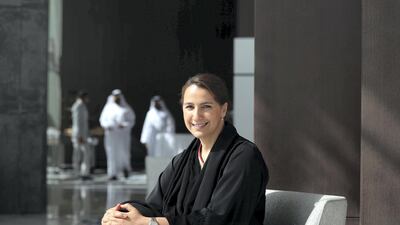Abu Dhabi is to build the world's largest indoor farm as part of a major drive to bolster the UAE's food security.
The GreenFactory Emirates aims to produce 10,000 tonnes of fresh food every year on a 17.5-hectare plot with a cultivation area spanning 160,000 square metres.
The forward-thinking project is being developed by Abu Dhabi's RainMaker Capital Investment in partnership with GrowGroup IFS from the Netherlands.
The hi-tech agriculture scheme has been hailed by Mariam Al Mheiri, Minister of State for Food Security, as "instrumental" to the nation's mission to become more self-reliant.
"The private sector play a vital role in the transition towards more sustainable food systems," she said.
"Private sector organisations have entrepreneurial traits that drive innovation. They possess the qualities necessary to disrupt existing non-sustainable agricultural systems."
"The UAE is applying concerted efforts to improve its domestic production of food, with agricultural technology – ‘AgTech’ – having a hugely important role to play.
"In fact, key targets of the government’s National Food Security strategy launched in November 2018 are to generate a 30 per cent yield improvement from technology-enabled production and for the UAE to become a world-leading hub in innovation-driven food security by 2051.
"Indoor farms such as GreenFactory Emirates are instrumental in helping us reach these goals."
Officials from both companies said the vast facility will boast a world-leading indoor growing system which combines vertical and flat farming and is able to overcome challenges typically posed by dry climates such as found in the Emirates.
Advanced farming methods will reduce water consumption by 95 per cent and cut carbon footprint by 40 per cent, a joint statement said.
As part of the ambitious plans, indoor farms are set to be built in other parts of the world affected by extreme climates.
Phase 1 of GreenFactory Emirates is due to be in operation prior to Expo2020 Dubai, which gets under way next October.
The innovative indoor farm is to be showcased at the high-profile global event.
Lody Embrechts, Dutch ambassador to the UAE, expects the Emirates to reap the rewards of knowledge cultivated in the Netherlands.
The embassy played a role in bringing businesses based in the Middle East and Europe together.
"The Netherlands has a lot to offer across all aspects of the food value chain," said Mr Embrechts.
"This flagship project is a symbol of the know-how and expertise available back home.
"As an embassy we are proud to have been able to contribute – within our means – to this project. We hope to intensify our co-operation with the UAE to further develop the local agriculture ecosystem."
Last month, Sheikh Mohammed bin Rashid said the challenges of the Covid-19 pandemic had highlighted the crucial need for the country to make its food and water security strategy a top priority.
The Vice President and Ruler of Dubai said ensuring the nation is self-sustainable and able to protect its resources would be key to its development in the post-coronavirus age.
“The Covid-19 pandemic has given us a better view and a bigger ability to deal with challenges," said Sheikh Mohammed during a meeting with Ms Al Mheiri.
"We have to build on this experience to enhance our food and water security.
“Our food and water security is part of our national security. And the sustainability and preservation of the level of comfort in the UAE requires us to enhance national awareness on the importance of preserving our resources and creating a self sufficient system.”












